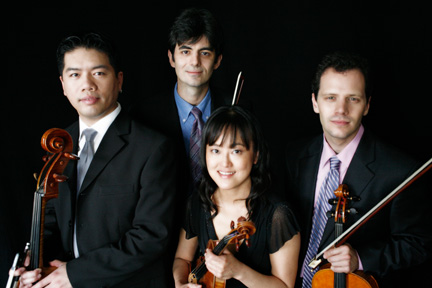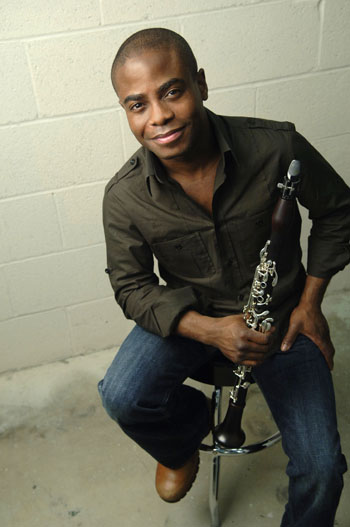Clarinetist McGill returns home to join Avalon Quartet in Brahms
The applause that greeted clarinetist Anthony McGill as he entered the Merit School of Music’s Gottlieb Hall Sunday night for a performance of the Brahms Clarinet Quintet was like that one hears when a rock star has entered the building.
For McGill, a Merit alumnus who is now the principal clarinetist of the Metropolitan Opera Orchestra, the appearance represented a homecoming performance of sorts; even small children in the audience were able to point at him in recognition from his performance of Simple Gifts with Yo-Yo Ma and Itzhak Perlman at the inauguration of President Barack Obama in January.
Growing up in Chicago’s Chatham neighborhood, McGill’s extraordinary success and journey from inner-city youth to a principal position with one of the nation’s top orchestras is everything that the Merit School stands for, and the large and diverse turnout indicated the immense pride felt for McGill as one of the school’s own.
Accompanied by the Avalon Quartet, McGill did not disappoint. His performance of this most beloved of Brahms’ post-“retirement” works became a tour de force of the master musician that McGill has become, able to achieve a very straight and sturdy tone at even the quietest levels with remarkable agility and grace. The dynamic contrasts, particularly in the Quintet’s famous Adagio movement, served the work well.
The Avalon, for their role, responded to McGill’s lead in a poetic manner, especially during the Adagio, but at times tended to overwhelm the clarinet sound in the other movements. Yes, this was their program and McGill was their guest, but this is the Brahms Clarinet Quintet, after all.

Following the autumnal theme, the Avalon devoted the first half of the program to late quartets of Schubert and Beethoven, the so-called Quartettsatz of Schubert, and the Beethoven String Quartet No. 12 in E-flat Major, Op. 127.
The comparison was a fascinating one, since both of these works, written across a span of a few years in the 1820s, represent a move toward a more radical sonic world for each composer.
The Quartettsatz, with its free-ranging cello line and use of tremolo seems to have come out of left field and ultimately proved so distinctive that Schubert decided to allow the single movement to stand on its own.,
The Avalon performance chose to emphasize its quirky qualities and yet, by playing up every modulation and change of direction with a tempo or dynamic shift, really drove home what a radical work this was.
Not surprisingly, the radical elements of the Beethoven Op. 127 were also stressed, the Avalon choosing to clearly delineate each variation in contrast to its straight-ahead opening. The work is full of surprises and the players have carefully worked them out to a point where they came off as child’s play. This was an aggressive, sometimes over-the-top performance, but a heartfelt one that revealed much in the way of transparency and the controlled sense of chaos in this music.
Posted in Performances





